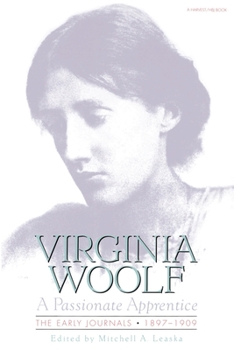Passionate Apprentice: Early Journals
Select Format
Select Condition 
Book Overview
These early journals record Virginia Woolf's "sublime trajectory" (Bloomsbury Review) from a gifted adolescent to a professional writer and complete the magnificent self-portrait provided by her published letters and diaries. Edited and with a Preface and Introduction by Mitchell A. Leaska; Index.
Format:Paperback
Language:English
ISBN:0156711605
ISBN13:9780156711609
Release Date:May 1992
Publisher:Houghton Mifflin
Length:512 Pages
Weight:1.40 lbs.
Dimensions:1.3" x 6.2" x 9.0"
Customer Reviews
1 rating
Dare We Look Past The Fragments and Discords?
Published by Thriftbooks.com User , 27 years ago
Sunday 5 September 1897: "Rained all day, except for an hour in the afternoon when Nessa & I tramped forth for a long muddy walk." Monday 6 September: "Jack & Gerald went. In the afternoon we went for a long walk with father- We lost Shag & Thoby, & were altogether furious." Many of the journal entries contained in A Passionate Apprentice contain trivialities such as these, telling us the who, why, and when of visits and visitors. In his introduction, Leaska refers to the entries holistically as "that rare instance when a writer of great importance leaves behind not only the actual documents of an apprenticeship, but also a biographical record of that momentous period as well." A reconciliation begs to be made here, as trivialities can hardly be equated with the revealing autobiography Leaska alludes to. True to Virginia Woolf's artistic credo, it is therefore the reader's task to realize the whole made of "shivering fragments," the symmetry composed of "infinite discords." Ironically, this causes much of Leaska's research to be unceremoniously ignored. Only readers who have been tempered in the Woolf canon should dare enter these pages, for their content is wasted on the unfamiliar. Even for those who survive such a culling, there still remains the task of ingesting all the background explanation that Leaska has so scrupulously procured in footnote, and this is all but impossible, let alone desirable. We need not trouble ourselves with tromping through the genealogy of a one time visitor at tea, or of the concert programmes for performances Woolf attended. Nonetheless Leaska has supplied information such as this, giving the journals a completeness only Woolf herself might appreciate for the way they contextualize even the minutest incident. For the laity, however, this much context is all but a nuisance. We have enough shivering fragments already. The additions Leaska provides with his research are admirable in presence, but not always useful. Once we move past this cotton wool, however, we expose several gems to the critical air. The first of these is rather basic, the general account of life in England at the turn of the century that is wholly foreign to our current dependence on technology. Thursday 13 May 1897 tells us, "Evidently the runaway had collided. A glimpse out of the door- to which the young ladies all crowded to get a better view- showed one horse on the ground and a second prancing madly above it- a carriage was smashed up & a wagon turned over on to its side." Then on Sunday 7 February 1897 there is, "The dogs have all got their muzzles off by this time- the muzzling order was taken off one day last week. Nessa, therefore, lives in constant fear of a dog fight" (here Leaska's research is most helpful in explaining the 1871 Muzzling of Dogs Act in Great Britain). The beauty of these glimpses into the past is that they are purely inadvertent. We may attach to them a historical significance that Woo






